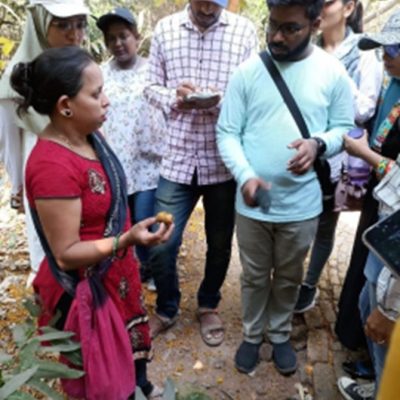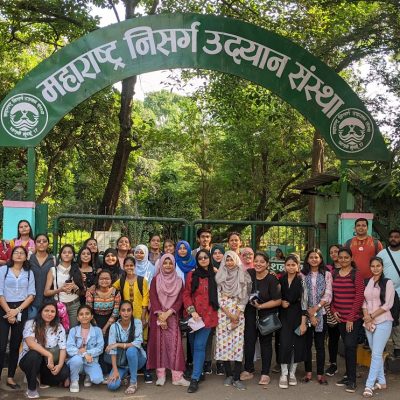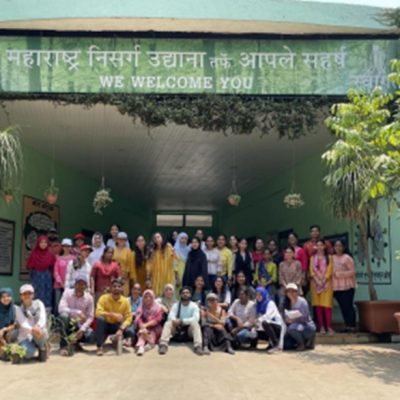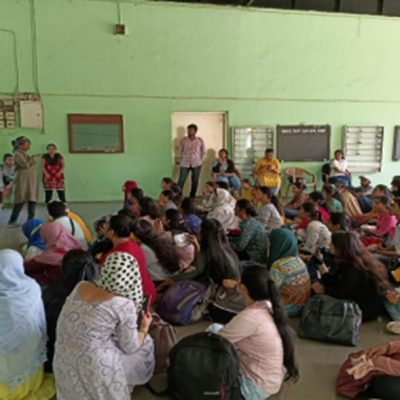
Maharashtra Nature Park Field Trip | 28th Apr 2022
REPORT ON FIELD TRIP
TO
MAHARASHTRA NATURE PARK
Submitted by
Gandhi Shikshan Bhavan’s Smt. Surajba College of Education, Juhu Versova Link Rd, Sainath Nagar, MHADA Colony, Juhu, Mumbai, Maharashtra 400049
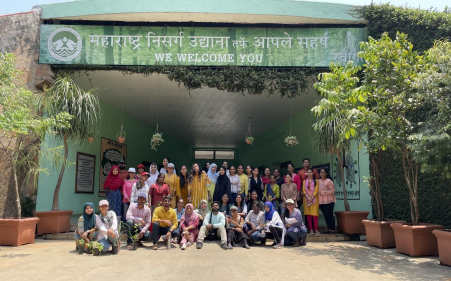
Contents
| Sr. No. | Topic | Page No. |
| 1 | About College | 3 |
| 2 | Maharashtra Nature Park Society, Mumbai | 4 – 6 |
| 3 | Planning of Field Trip | 7 |
| 4 | Activities held at the Maharashtra Nature Park Society | 7- 8 |
| 5 | Verbatim quotes during field trip | 9 |
| 6 | Pictures with captions | 10 -11 |
| 7 | List of Participants | 12-15 |
ABOUT COLLEGE
Gandhi Shikshan Bhavan’s Smt. Surajba College of Education is a teacher education institute, with a unique reflection and blend of the Gandhian philosophies and ideals. It was inaugurated on 2nd October 1969, the birth centenary of Gandhiji to implement the ideas of basic education to the level of teacher education and school education along with research, community development and publications.
The college works under the aegis of Indian Council of Basic Education (ICBE. The curriculum for B.Ed. is designed and transacted in a dynamic manner here. The main task of teacher education institutions is to equip the student teacher with knowledge, skills, methods and realities of life to survive in this society.
There is an active way of learning here which is the key approach in Basic education as self-study, field work, correlated studies, dramatization, freedom from fear and inhibition of any kind. Hard work, honesty, cooperation, self-help, respect for all religions, art of living together and tolerance which are fostered by the institution are accepted by the students by and large. Gandhian philosophy is intrinsically interwoven in curriculum of. Smt. Surajba college of Education in all its aspects. Consistent with the objectives of Gandhian values of education the college has a programme of productive as well as creative work of various types. The new student teachers from our institution introduced the Gandhian ideas of education and Gandhian values of peace and non-violence these are the basic needs not only for our country but also for globe too.
The mission of the institution resonates towards Nurturance and dissemination of Gandhian values to develop innovative involved and dynamic teachers for the welfare of society. Along with a vision of providing quality education for empowerment and enlightenment through Gandhian philosophy to prepare socially committed teachers. Thus following goals are established and worked upon by the institute, reflecting the vision and mission of the college: making teaching & learning an enjoyable experience, creating teachers with well-integrated personality, preparing teachers as agents of social change, ensuring harmonious development of teachers for a peaceful society, etc.
Some of the unique features and initiatives carried out by the institute can be listed as follows:
- Innovation in teaching learning practices
- Emphasis on reflection, feeling and doing.
- Dedicated team of teachers
- Endowed with a natural and beautiful campus.
- Integration of teach education with community education.
- Sarva dharma Prarthana
- Sarvodaya Pathra
The institute, thus tries to establish a healthy relationship between the individuals and the society by inculcating values and virtues including respect, tolerance, commitment, culture, compassion and sensitivity.
MAHARASHTRA NATURE PARK SOCIETY
With the gracious contribution of the Government of Maharashtra, MMRDA, WWF, Dr. Salim Ali and other significant stakeholders, the Maharashtra Nature Park Society symbolizes the transformation of a dumping ground to an abode of the diverse flora and fauna. The park was declared open to the people on 22nd April 1994-“Vasundhara Divas World Earth Day”. The park is now converted into an Environment Education Park and thousands of students as well as visitors visit the park every year for the study of Nature and Environment related issues.
Managing a garbage Dumping site is a global problem now for almost all the countries. MNP being a trend setting solutions for this problem. People from different cities and various countries pay special visit to the park to see the efforts and to experience the effects. The efforts made here are well appreciated by all the people including dignitaries and the scientific community across the world.
The park aims to provide the citizens of Mumbai a quick change to relatively green and unpolluted area and to educate the people, particularly children in Ecology and Nature Conservation.
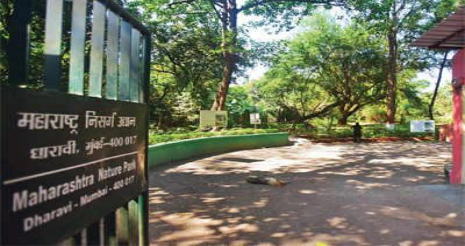
The park is presently involved in number of activities related to Nature Conservation and Environmental Education. The park has different sections to explain the various aspects of nature education. Some of them are as follows:
Butterfly Garden: Study of butterflies includes knowing their local host plants, the flowers they visit and pollinate, their survival strategies like camouflaging and mimicry and whatnot. In the congested city like Mumbai, creation of butterfly garden was also very instrumental in conservation of (and thereby increase in number of) butterfly at MNP. It is delight for the eyes to have them in such huge numbers, today the total count has reached to 85 species. Butterflies are indicator of good quality of air (something
which is always missing in big cities like Mumbai) and therefore creating a Butterfly Park is an education maintaining a better quality of the air.
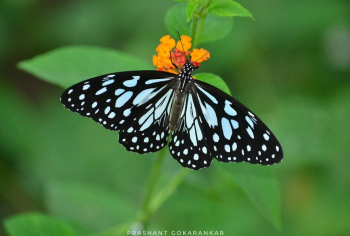
Nakshatra Van: Ancient Indians believed in astrology (many still do!). Indian astrology classifies a human being into 27 group as they are considered as born under specific constellation-the Nakshatras. There are 27 constellation’s, and each has one plant (tree, shrub or herb) associated with it. Whatever be the merits of their beliefs regarding the heavens, there is no doubt that here on earth its proponents were meticulous documents of nature. More in keeping with the emotional connections that are associated with such myths than any science, different trees and plants finding mention in ancient texts have been planted in a circular garden, called the “Nakshatra van”. Many visitors find this to be an inexplicably peaceful part of the park and can be seen quietly meditating under the shade of its now well-developed trees.

Rain Water Harvesting: During the dry months of winter and summer, the MNP requires an average of 45000 to 1 lakh litre of water daily, most of it for irrigation purposes. This makes the Nature Park depends mostly on the municipal water supply, with some of the demand met from other sources. The Rainwater Harvesting Projects has been conceived and designed to make the MNP almost completely self-reliant for its water requirements. When fully operational it will ensure that nearly 2.5 crore litres of water is collected from the surrounding landscape, including the rooftop of the Education Centre Building. The storage pond will also result in wetland habitat of nearly an acre in extent and help attract additional fauna. This important project also makes a perfect back drop for setting up platform to provide information and as demonstration site, on rain water harvesting.
Thus the institute encompasses a wide variety as well in terms of the exquisite flora and fauna, amphibians, reptiles, spiders, etc.
PLANNING OF THE FIELD TRIP
Gandhi Shikshan Bhavan’s Smt. Surajba College of Education organized a field trip for B.Ed. students on 28th April 2022. The field visit aimed towards acquainting the students with the diversity of the nature through the means of an informative and interactive trail and sessi0on through the park. With the composition of beautiful flora and fauna, the park radiated its beauty in the different colours of the nature through the various butterflies, reptiles, leaves and the enlarged green cover depicted the serenity of nature through visual and audio appeal of the friends of nature. The total number of participants included 87 students from F.Y.B.Ed and S.Y.B.Ed. The trip was scheduled from 9:00a.m. to 12:00 noon.
ACTIVITIES HELD AT THE MAHARASHTRA NATURE PARK SOCIETY
The field visit encompassed a beautiful and informative trail through the various major sections of the park in a proper sequence with detailed explanation and discussion on the various species, birds, insects, etc. the trip commenced with an introduction and orientation about the park through the means of a documentary, followed by the distribution of students in three groups of 30 students with a guide to lead through the trial, ensuring equal attention to all student visitors. The trail began with visual appeal and discussion on “butterfly” and the close observation of various coloured butterflies and insects, understanding their life cycle and relation with nature.
Followed by arrival at the Nakshatra Van, through which everyone was allowed to explore and understand about the 27 varieties of flora in relation to the Indian astrology. The guide led through the importance and the usage of the various available trees and shrubs, discussing on the relevance to the name of the respective tree as well as its popular demand, flowering period, etc. the trail through this section helped in understanding the medicinal significance of the biodiversity rendered by the environment and the solutions to different man-made ailments within the close vicinity of human race. It also helped in deriving knowledge about the significance of certain fruits, leaves and flowers in maintaining a healthy body.
The trail further proceeded towards a forest area involving different kinds of trees particularly ripening fruits and flowers, for e.g., custard apple, tamarind, etc. The trail highlighted the importance and precautions to be taken while the consumption of certain kinds of fruits and plants, at the same time depicting the wide importance of certain fruits in nearly curing certain diseases. The diversity in the fragrance of different flowers and fruits, the diverse textures of the bark, the shapes and curvatures of the leaves along with the visual appeal of the diverse colours filled the experience with realistic and practical learning.
Depicting the atrocities of the human developments initiatives and its consequences on nature, the trail continued towards a detailed discussion on the condition of the Mithi river, as a result of the waste disposal and untreated water into the river body resulting in harming the aquatic ecosystem and nature at large. Further walking towards the centre of vermicomposting, the guide explained about the steps followed in the vermicomposting and its significant usage in natural growth of various plants. The guide also highlighted upon the relation between the consumption of artificial fruits and vegetables grown using the harmful fertilizers and its impact on human health and rising diseases. Further students were encouraged and allowed to explore through the nursery of the park, to purchase desired plants and shrubs, which involved active participation by the students to further grow various possible plants at their home.
The trip was a wonderful experience is providing with knowledge and awareness about the nature, developing curiosity and appreciation for the diversity of the natural components through the means of active participation and exploration.
Time Table of Field visit
| Time | 8:15 am –
8:45 am |
8:45am –
9:15am |
9:15am – 9:45am | 9:45am –
12:noon |
12noon – 12:30pm |
| Activities | Assembling at the Park | Buying
tickets and other formalities at visiting place |
Students watched a documentary on the
Maharashtra Nature Park Society |
Nature trail of the
students in three groups along with respective guides |
Snacks and photo session. Followed by the exit
formalities |
VERBATIM QUOTES DURING THE FIELD
Some of the verbatim quotes shared by the students are as follows:-
- The nature park experience is very nice . I saw the different types of trees which is useful for medicine, different types of butterfly. (Manju Yadav – S.Y.B.Ed Student)
- It was a wonderful experience in the park we saw variety of bird species as well plant and I bought 2 plants for my home as well. (Asma Khan F.Y.B.Ed Student)
- It was an amazing experience to the nature park. Inbibed lot of information which were new and developed more curiosity to learn about nature In nature, nothing is perfect and everything is perfect. Trees can be contorted, bent in weird ways, and they’re still beautiful. (Renuka Avchite S.Y.B.Ed Student)
- So beautiful place learn many things. (Priyanka Yadav F.Y.B.Ed Student)
- It was very pleasant to visit Maharashtra Nature Park. I was very astonished to know the history of MNP. It was very wonderful job done by the Salim sir and the team. I feel very disappointed to see the condition of the river, it was looking like a gutter. Overall I enjoyed to see the different species of plants, trees, birds and butterflies. (Jamila Khan S.Y.B.Ed Student)
- Maharashtra Nature Park was a wonderful experience with wonderful trees and plants and with birds. No one will say that it was a dumping ground. Amazingly maintained. (Darshan Makwana S.Y.B.Ed Student)
- Mesmerizing nature experience with an informative, interactive and realistic trail. The beauty of the diverse flora and fauna was reflected in the abode of greenery and colours of environment. (Poornima Warrier S.Y.B.Ed Student)
PICTURES
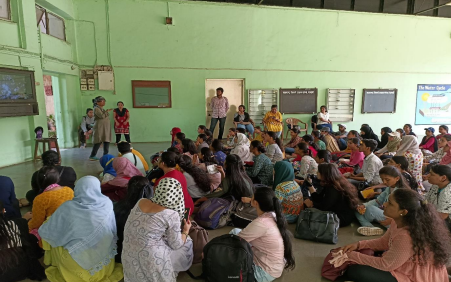
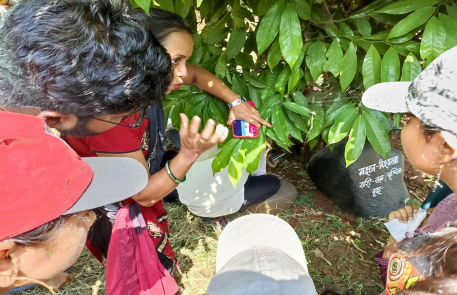

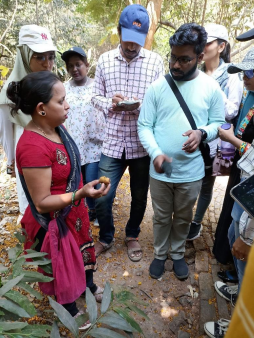
LIST OF PARTICIPANTS
NAMES OF THE STUDENTS ( F.Y.B.Ed)
- ALMEIDA NERISSA MARYAN
- ANSARI NUSRAT KHATUN ABDUL MUNEEM
- ANSARI RUKHSAR MD NISAR
- ANSARI SABA NAAZ AYYUB
- AWHAD POOJA SHIVAJI
- BANE MINAL GAJANANT
- BARIK SHUBHAM RABINDRANATH
- BEHLIM FARHEEN IQBAL
- BURKHAO RICHARD JOHNSON
- CHAUDHARI PRACHI MOHAN
- DEBNATH RIMPA DIPESH
- JADHAV APOORVA MILIND
- JHALAWAT RUSHABH PARAG
- KHADE SONI RAVINDRA
- KHAN ANIQAH SARWAT
- KHAN ASMA KHANAM KARIMULLA
- KHAN UZMA IMRAN
- KHAN ZEENAT MAZID
- KOKYANI IQRA ALTAF
- KUMARI NEHA SINGH
- MAHADIK VAIDEHI GANESH
- MAKANDAR NAMEERA ABDUL KADAR
- MANSOOR AFREEN ASLAM
- MISHRA SUNITI RAMASHANKAR
- NAIK BHAVIKA GOVIND
- NAIK PURVA VIKAS
- PANDEY AKANKSHA SANJAY
- PRAJAPATI TANMAY MITTHU
- PRIYA DHARSHINI ARULRAJ
- PUDALE SUMIT SHANKAR
- ROKADE PRERANA SUNIL
- SANDIM PRATIKSHA BALKRISHNA
- SANKHE PARNIKA SADANAND SMITA
- SEQUEIRA LARISSA IGNATIUS SHAIKH
- AALIYA RAZA UR RAHMAN SHAIKH
- SHABENA AKBARHUSSAIN SHAIKH
- ZAHEERA
- SINGH PRATIKSHA
- SONI NIKI GOPAL
- SWAMY SANSKRUTI MAHESH
- SYED MISBAHJAHAN ZAMEER
- UPADHYAY PRIYANKA
- VISHWAKARMA RAKHI TRIBHUVAN
- YADAV JYOTI VIJAYSHANKAR YADAV
- PRIYANKA KAMLESH YADAV
- SIDDHARTH
NAMES OF THE STUDENTS ( S.Y.B.Ed)
- AISHWARYA BHARAT CHAVAN
- ANUSHREE RAVI KAMBLE
- ARFA MD IMRAN
- ARWA ADNAN CYCLEWALA
- DARSHANA HIMMAT MAKWANA
- DEEPA TRIVENI DUBEY
- FELSY XAVIER CHOWRY
- GAURI LALSA PAL
- GAYATRI DEEPAK JOSHI
- GULISTA FIROZ KHAN
- HELI HITESH SAIYA
- JAMILA KHATOON MOHD SHARIF KHAN
- JUHI RAM MARNE
- KARUNA PRAKASH KHADSE
- MAHEK KHAN
- MAHESH VALMIK MUNDHE
- MANDAL PRATIBHAKUMARI KRISHNAKUMAR
- MANJU SATISHCHAND YADAV
- NAHEDA NOOR KHAN
- NEEDA NAEEM SHAIKH
- NEHA PRASHANT MISHRA
- NIDHI RAJESH GUPTA
- PAVITHRA KRISHNAN YADAVAR
- POORNIMA PREMKUMAR WARRIER
- PRANAY DEEPAK JUWATKAR
- RADHA SANJAY JOSHI
- RAJSHRI VASANT ANDHAKAR
- RENUKA DEEPAK AVCHITE
- RIA JOSEPH TAURO
- RUKHSAAR ABDUL KADEER SHAIKH
- RUKSAR ANSAR ANSARI
- SABINA HAJI KASSAM LASSANWALA
- SABIYA JAVED FAKIH
- SANIYA ASLAM CHOUHAN
- SAYANA RABIUL JAMAL SHAIKH
- SHARMILA KISHOR MAYEKAR
- SHIFA ABDUL SATTAR NAIK
- SONAL SANTOSH DUBEY
- SONIA NAZARETH BHARKO
- SWAPNIL DINKAR FADALE
- VAISHALI MAHENDRAPRATAP SINGH

